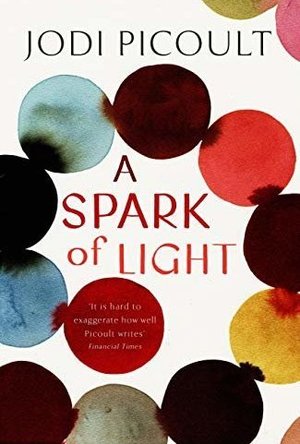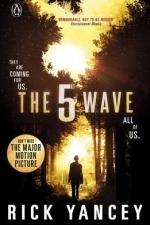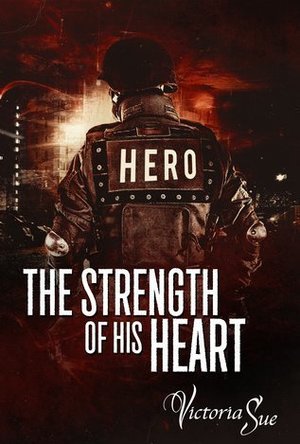
MDCalc Medical Calculators
Medical and Health & Fitness
App
Join the 1 million+ medical professionals who use MDCalc daily to support clinical decision making...
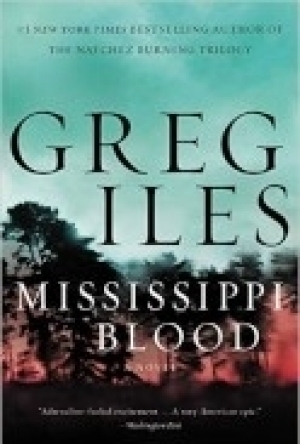
Mississippi Blood
Book
#1 New York Times Bestselling Author The endgame is at hand for Penn Cage, his family, and the...
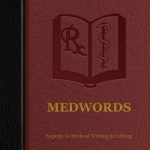
Carter’s Encyclopaedia of Health and Medicine
Health & Fitness and Medical
App
Carter’s Encyclopaedia of Health and Medicine is an extremely comprehensive iPad application...
Kristy H (1252 KP) rated A Spark Of Light in Books
Mar 12, 2019
"Here was the one thing all these women had in common: they hadn't asked for this moment in their lives."
Jodi Picoult is known for her powerful books that make you question the world around you, and her latest is certainly no exception. This novel asks interesting, thought-provoking, and timely questions: not just about abortion but about women's rights in general and the power men have over women, including their bodies. It makes you think, and it's certainly not an easy read. I found it to be an eye-opening experience. You may go in with a set view and particular political stance--and while this novel is in no way attempting to change your view--it allows you to see things from all sorts of points of view. The book is filled with complicated people and their stories; nothing is simple here.
The novel is told backward: starting with a shooter entering the clinic and working back from that moment. I'm not always a fan of this format, and it does take some getting used to (for me anyway). I read this one while I was sick and busy at work, so I always had to pause a little bit to get my bearings with each chapter. But the format causes the story to be extremely tense, forcing you to really want to know what happens. I've read some reviews where they thought the backward style left nothing unexplained/nothing left to know, but I found it to be the opposite. The first chapter leaves you with a near cliffhanger, and you spend the rest of the book frantically flipping the pages, trying to find out what happens.
I found this one to be especially poignant and excellent at portraying its characters. Picoult captures moments in time, as our characters remember back on things. It's a lovely look at fatherhood for two sets of families, and Hugh and his daughter, Wren, are a wonderful pair. Picoult does an excellent job paralleling them with another set of characters, too. Then there's Izzy, a nurse, with whom I dare you not to fall in love, and Dr. Louie, the doctor at the clinic. Both are so tough and easy to root for. I also learned so much while reading about them. It was easy to picture these characters and even easier to fall for them--all signs of a well-written novel.
By the end, Picoult has some twists up her sleeve: some surprising, some not. I thought the ending wrapped up a little quickly, but I still was impressed with one. You don't enjoy it, per se--the subject matter is a little rough for that, but you'll find yourself wowed by the characters and their shared story. 4+ stars.
I received a copy of this novel from the publisher and Netgalley in return for an unbiased review (thank you!)
Kyera (8 KP) rated The 5th Wave: Book 1 in Books
Jan 31, 2018
When the first wave comes, all technology is gone in a moment. An EMP takes everything out. The second wave caused massive tsunamis and destroyed the coasts of the world. The third wave infected and killed 97% of the remaining population in brutal fashion. The fourth wave destroyed all trust in humanity and introduced the constant threat of drones. The wave that makes you question every action... and the fifth wave... is us.
Cassie must survive in this strange world with no mother, father or brother to care for anymore - fighting and living because if she is the last human on Earth she refuses to go out with a whimper. She will fight until she can fight no longer. But she is not the only body left, even if she may be the only one with her own mind left. It is possible that one in every three people left is an Other. A Silencer. An Imposter. Has your mind and body been hacked? Do they look like us or can they make themselves look like us? Or maybe they've been here all along. Waiting. That's when you can't trust your eyes. You may be looking at an Other and not even realize it.
We next meet Ben, who must rediscover his fighting spirit if he wants to survive and survive he must. After not succumbing to the virus that infected him, he cannot give up. Taught to fight and given a new name, he must battle for his place.
Part III shows us a new perspective, an Other awakened in a human body and given a mission. To kill. To finish the human race, one by one. He has been tracking Cassie for a while and takes aim. Shoots. Traps her, but for some reason cannot bring himself to finish her.
Hunted. Shot. Then saved? Cassie wakes up being tended to by Evan on the family farm. He is the only one left of his family. Evan helps to nurse her back to health, bakes bread, carves walking sticks and wants to help her rescue her brother Sammy. What can't this farm boy do? And why does this make us so suspicious? Even Cassie can't quite bring herself to trust him. There are just little things that seem off, like a life-long farm boy with smooth hands and perfect cuticles. No callouses to be found. There's a small nagging feeling in her mind that asks- what if he's an Other?
The characters are well written and believable. You feel for them. Root for their successes and hurt when they fail. You wish for their survival despite the current chaos and destruction of the world. The world is familiar and yet fundamentally altered by the Others.
The book draws you in from the start and you puzzle over people and motives. Who will survive and if the human race survives this destruction, how will this ordeal fundamentally change the survivors? I am constantly questioning my conclusions and re-evaluating what I believe i happening. A great book is able to reveal just enough that the entire plot is not given away by page ten. This post-apocalyptic, alien-invasion novel is highly recommenede, especially if you plan to watch the movie. I cannot wait to read the next book, Infinite Sea!
Kristy H (1252 KP) rated Small Great Things in Books
Feb 1, 2018
This is a touching and powerful novel. Told from the varying points of view of Ruth, Kennedy, and Turk--baby Davis' father-- it is a compelling look at how race and family history shapes the person we become. It is a poignant story at points: it is amazing what people can rationalize when it comes to hatred. I found the novel very fitting right now, with what's going on in the U.S. Honestly, it's very frightening at times and hits a little too close to home.
Picoult's characters are well-formed and dynamic, and you find yourself drawn into parts of each.
Turk, obviously, despite the loss of his child, is not a sympathetic character, but he is a complex one; his progression over the course of the novel is intriguing, and it's amazing how Picoult did not make him a one dimensional white supremacist. The book is extremely well-researched; both from the side of white supremacy, as well as racism and the medical aspects of Davis' case. Kennedy is likeable and her struggle with Ruth's case, as she realizes the depth of both the visible and latent racism her client faces on a daily basis, is real and relatable. I applaud Picoult for tackling such a difficult subject with such honesty. It's almost as if, through Kennedy, she's admitting exactly what she doesn't know. (I highly recommend reading Picoult's afterword, as well.)
For me, the hardest parts of the book was that it gets a little too poetic in the Jodi Picoult way (those who frequently read her novels will identify), with her waxing on about race and parents and being brought together, versus letting the story tell itself. At points the book just goes on and on a bit, versus getting to the story and the point. There are lots of little subplots that go off, detracting at times from the main story and frustrating the reader. And, of course, there are some weird twists and plot points in the typical Picoult style, though they don't seem to pack the punch of her older novels. It all wraps up a little too smoothly, though I have to confess I sort of enjoyed the ending. It may have been a bit trite, but I am often a sucker for such things.
Overall, I was impressed with how Picoult approached this novel, and I enjoyed the storyline for the most part (I was certainly invested), though it dawdled at times and ended a bit too easily. I'd rate this a strong 3.5 - 3.75 stars. Certainly worth reading, especially if you're a Picoult fan.
I received a copy of this novel from the publisher and Netgalley; is available everywhere as of 10/11/2016.
Debbiereadsbook (1647 KP) rated The Strength Of His Heart (Enhanced #4) in Books
Jul 15, 2019
This is book 4 in the Enhanced series, and it’s not necessary to have read/listened to the other three books, but it might help give you a better picture of what it means to be Enhanced, and what this team means to Vance.
All Vance wanted to do, as a child, was follow in his father’s footsteps and join the police force. Waking up with the mark on his face put pays to that, but he was one of the lucky ones. His family did not treat him any differently, and they love Vance, period. Sam’s upbringing is very different, never knowing his father, and his mother dying when was he was a small child. Joining the DEA as an undercover agent helped him get over that, but now he wants out. Meeting Vance and the members of HERO is a dream come true, and Vance himself is a wet dream come true for Sam. But Sam won’t be drawn into anything with the much bigger man, he suffered before and will not again. But when Sam is kidnapped and Vance’s undercover gig is blown, they have to trust each other’s heart will be strong enough to get them out of this.
Vance is a sweetheart! Oh, I loved him here, once we get into his head. He really just wants to look after people, even though his gift was size and strength, he doesn’t want to use it. And Sam? Sam pushes all of Vance’s buttons and then some, he really does. Vance is smitten, right from when we met Sam in book three, and being partnered with Sam here? Vance is in heaven. At least till Sam and Vance have an encounter that ends all kinds of wrong for all kinds of reasons and neither man will talk to the other.
Sam’s past comes back to kidnap him here, and when it’s discovered WHO? I did NOT see that one coming, let me tell ya! But what they are doing with Enhanced adults and indeed some children, is awful, and it’s difficult reading, it really is.
This is far less explicit than the other three books, but I think it didn’t need to be. There is enough of Vance and Sam’s emotions to keep you going!
We meet Vance’s brother here. And while I had him pegged as the partner of a certain nurse, it turns out I am wrong and one of the team is strangely affected by Daniel. Their story, I *think* is next and I cannot wait to read it! Or listen, rather, cos I don’t like to flip between listening and reading in a series!
Nick J. Russo again narrates.
I am loving the combination of Ms Sue and Mr Russo, I really am!
Russo’s voices are clear and consistent across all four books, and his reading voice is deep and even. I have no trouble keeping up with multiple person conversations.
It’s the EMOTIONS I find, that Russo gets across. You can’t always pick that up when you read a book, no matter how well it’s written (and these books are VERY well written!) but hearing someone’s voice, telling you about their rotten childhood and what they had to do to survive, it gets you, right in the heart. I had to stop what I was doing many times, just to LISTEN, you know?? I had to concentrate on what was being said, cos it got to me so much.
I hope that Russo will continue to narrate the books that Victoria Sue continues to write! Cos you know, everyone needs to be happy, and they ain’t right now!
5 stars for the book
5 stars for the narration
5 stars overall
**same worded review will appear elsewhere**

Medisafe Pill Reminder
Medical and Health & Fitness
App
Never forget to take your meds and pills again with the MUST HAVE pill reminder ranked #1 by...

Medical Lab Tests
Medical and Health & Fitness
App
Medical Lab Tests is the perfect pocket tool for medical laboratory tests and enables you to browse...
Hadley (567 KP) rated Jericho's Wall in Books
Sep 14, 2020
Our main character Joshlynn, who's going on 16, is preparing to take her Forever Test, which tells her what her permanent profession will be the rest of her life. Everyone has to take this test in this world, and they have no say in what their profession will be, but to Joshlynn's surprise, she gets to become a doctor, something she secretly wanted to do for a living. While receiving this great news, Joshlynn also gets bad news about her mother, someone who has been sick for awhile, collapsed in the fields while working and was taken away by the Removers. These androids (maybe even people - - - it's never specified in the book) take people away when they are no longer of use to the community and kill them, and this is what happened to Joshlynn's mother. At first, Joshlynn is affected by this, but nearing the second day later, it seems as if she just forgets about it. Joshlynn moves on with her life that very night, being taken from a rundown apartment to an uptown apartment by Monitors, where hospital staff are housed- - - this apartment compared to her former one is like moving from living in your car to a fully furnished house.
She begins to intern with a cranky nurse named Magda, learning about medications and herbal remedies that the hospital uses. She also begins to work alongside a doctor named 'Cat' McBride, a nice and likable character, who shows her some of the patients, but memorably, the nursery. This is one of the most emotional parts of the story because, not only are parents not allowed to raise their own children (which they can only have one), but if the child is born with a defect, the doctors are ordered to let the baby starve to-death. Readers learn that the logic of Lord Baal is that a child with a defect is just that and of no use to the community.
But the upside of Joshlynn working at the hospital is that she meets a couple of people who become close friends of her's: Suz, a young woman who has been working at the hospital for nearly two years, and Grif, a trouble-making patient that is staying at the hospital for the time being. Later, Joshlynn finds out that the two are planning to make an escape to the 'wilderness,' which is the wooded areas surrounding the communities that are forbidden to enter by none other than Lord Baal.
There's not much more I can say about Jericho's Wall without giving away major points of the story. It was a very enjoyable quick read that I didn't want to put down, but that didn't make it flawless; like most books, there were inconsistencies here and there, but also there were some things that just didn't make sense. I don't think casual readers will notice these things without really looking for them. I, personally, just don't like inconsistencies in the stories I read.
I think young readers who enjoyed the Maze Runner will like Jericho's Wall.
